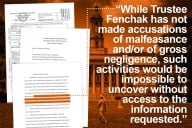You have /5 articles left.
Sign up for a free account or log in.
At this year's meeting of the Conference on College Composition and Communication, plagiarism was a hot topic, with many panelists talking about ways to teach students about academic integrity. Generally, panelists spoke of the importance of not relying on plagiarism-detection software, which they said may scare but doesn't necessarily instruct.
If you notice more positive discussion of plagiarism-detection software at next year's meeting, in San Francisco, it might be because Turnitin.com is hoping to pay for some instructors to go there. The company sent out an e-mail message this week to professors at colleges that use the popular service, telling them that if they apply to be on a panel at the conference to talk about plagiarism-detection services, the company will consider paying for them to go. The company also asked that instructors send it copies of their proposed papers -- but the company didn't inform the 4C's (as the association is known), which will be judging proposed topics.
Officials of Turnitin.com said that they were just trying to counter what happens at some meetings where you "just hear the negative," in the words of Katie Povejsil, vice president of marketing for iParadigms, the company that owns Turnitin.com.
"There's a lot of misinformation about how our product works, and how it's being used, and it's important that people who use it and like it and find it to be significant should get the opportunity to tell their experience with it," she said. "It's about highlighting models that are effective, furthering the teaching of kids. Isn't that what the 4C's is all about?"
At the same time, Povejsil's first statement, upon being asked about the company's offer to pay for some people to present at the meeting, was to ask that any coverage of the initiative be delayed. She said that the company was planning to expand the program to offer to pay for selected presentations accepted at a range of scholarly meetings, and that Turnitin.com only sent out the information now because of the approaching deadline for applying to present at 4C's.
Some of those who received the invitations were not pleased.
Steven Epstein, director of the Science Studies Program at the University of California at San Diego, said he immediately sent a reply e-mail that he was "not for sale."
"I was offended by the idea of being compensated by a company for making a scholarly presentation about the virtues of that company's product," he said via e-mail. "As a medical sociologist, I was struck by the apparent similarity to pharmaceutical industry marketing practices that have taken a lot of heat in recent years, such as when companies reward physicians who tout their products at conferences and other public events. I sincerely hope that any scholars who accept a 'grant' to talk about Turnitin.com preface their conference talks by disclosing that."
Others who were alarmed by the company's solicitation stressed that there was nothing wrong with a company going through the process of applying to appear at a scholarly meeting, as many do. In such cases, however, the company is identified as such -- and audience members can decide for themselves whether to listen to a corporate speaker or whether to consider the possibility of bias.
The issue of paying professors to attend the 4C's meeting is particularly sensitive because of the make-up of the association. Many of the people most knowledgeable about teaching composition are adjunct professors or full timers who are off the tenure track and who frequently don't have the same access as tenured professors to travel budgets and research support. As a result, there is arguably more discussion within the 4C's meeting than at some others about issues related to who can afford to attend and present. The conference has a fund to help those without travel budgets attend the meeting -- but applications for such support are not based on whether or not someone favors using Turnitin.com.
Kent Williamson, executive director of the National Council of Teachers of English, of which the 4C's is part, said he had never before heard of a company offering to pay people whose papers on selected topics are accepted for the annual meeting. He stressed that Turnitin.com did not ask permission to involve itself with the conference in this way and that the payments it makes are "not in any way a 4C's initiative."
Williamson said that the use of plagiarism-detection software was "a fair topic where multiple perspectives might be heard out our meeting, but you don't want there to be a financial skew in the process, where one perspective is funded while another one doesn't have any funding or support."
He also said that it would be "problematic" that reviewers will not necessarily know which proposals are from people hoping to obtain financial support from Turnitin.com to attend the meeting. "The reviewers will be fair and try to evaluate [proposals] on scholarly grounds," he said. "The concern is less about the initial review, and more about the fact that some scholars who may have papers accepted but not have the means to attend have no parallel fund to draw upon."
Povejsil rejected the idea that her company was in any way influencing the way ideas would get presented at the meeting. "If people think we're trying to stack the deck in our favor, that's just paranoia," she said. "The 4C's gets to decide which papers get presented and they decide what's worthy. All we're going to do is be supportive of the folks that do want to go that we feel deserve some extra support."
Asked if such support would go to a paper arguing that Turnitin.com wasn't effective or shouldn't be the emphasis of efforts to prevent plagiarism, she said, "I can't speculate about what we're going to actually get. If we got a lot of that, who knows."








